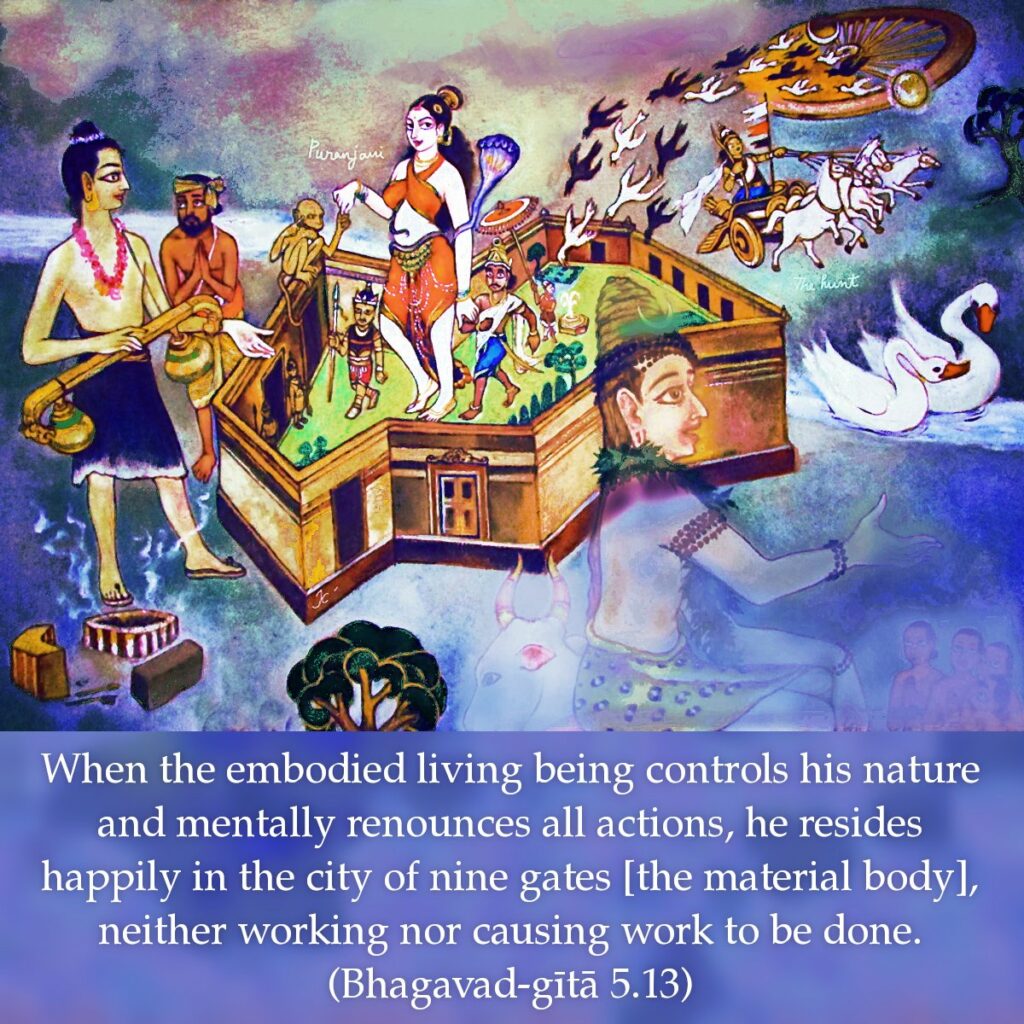सर्वकर्माणि मनसा संन्यस्यास्ते सुखं वशी |
नवद्वारे पुरे देही नैव कुर्वन्न कारयन् || 13||
sarva-karmāṇi manasā sannyasyāste sukhaṁ vaśhī
nava-dvāre pure dehī naiva kurvan na kārayan
sarva—all; karmāṇi—activities; manasā—by the mind; sannyasya—having renounced; āste—remains; sukham—happily; vaśhī—the self-controlled; nava-dvāre—of nine gates; pure—in the city; dehī—the embodied being; na—never; eva—certainly; kurvan—doing anything; na—not; kārayan—causing to be done
Translation:
Mentally renouncing all actions and self-controlled, the embodied being, rests happily in the nine-gated city (body) neither acting nor causing others to act.
Commentary:
The principle of happiness in life is explained here. First and foremost, the senses should be brought under control. Vasi means man of self-control. If the senses and a mind are not under control, even the conquest of the whole world is of no avail. Man cannot be happy. Therefore having controlled the mind and the senses the yogi rests happily in the body – (Vasi sukham aste).
The yogi should renounce all actions mentally. That is, he should give up the sense of doership and the attachment for the fruits of work. The body may work but the dweller in the body is completely at rest because he knows that the mind and the senses are functioning according to their own nature, and he the Drik (seer) is just a witness. There is no identification of the Self with the functions of nature. So the principle is to abandon all actions in the mind. The body, according to its own nature goes on acting according to its own laws. This mental renunciation is karma-Sannyasa, and not abstaining from work as idlers and incapacitated persons do. When one attains this karma-Sannyasa, he rests peacefully in his own state. He neither acts nor causes anything else to act.
The individual self rests in Atma unattached to and unaffected by anything taking place in and through the nine-gated city of the body.
In the nine-gated city: The body is described metaphysically as a city of nine gates – two eyes, two ears, two nasal passages, mouth, urethra and anus. The Self is the ruling monarch of this nine-gated city. In ancient times every great city had high gateways in different directions. When these gateways are fortified and strongly guarded, the King remains safe and secure. But if they are undefended, enemies can easily enter and disturb the city. Material enjoyments and pleasures are the enemies who come in through the gateways of the senses, enter the mind, and shake the throne of the monarch, harassing him in different ways. But the man of Self-control (Vasi) keeps those gate-ways closely guarded, and so he rests happily in his own state.
Question: How can man attain happiness?
Answer: By self-control and mental renunciation of all actions, man attains happiness.
Question: Is this renunciation physical or mental?
Answer: It is mental.
Bhagavad Gita: Chapter 5 🔻 (29 Verses)
